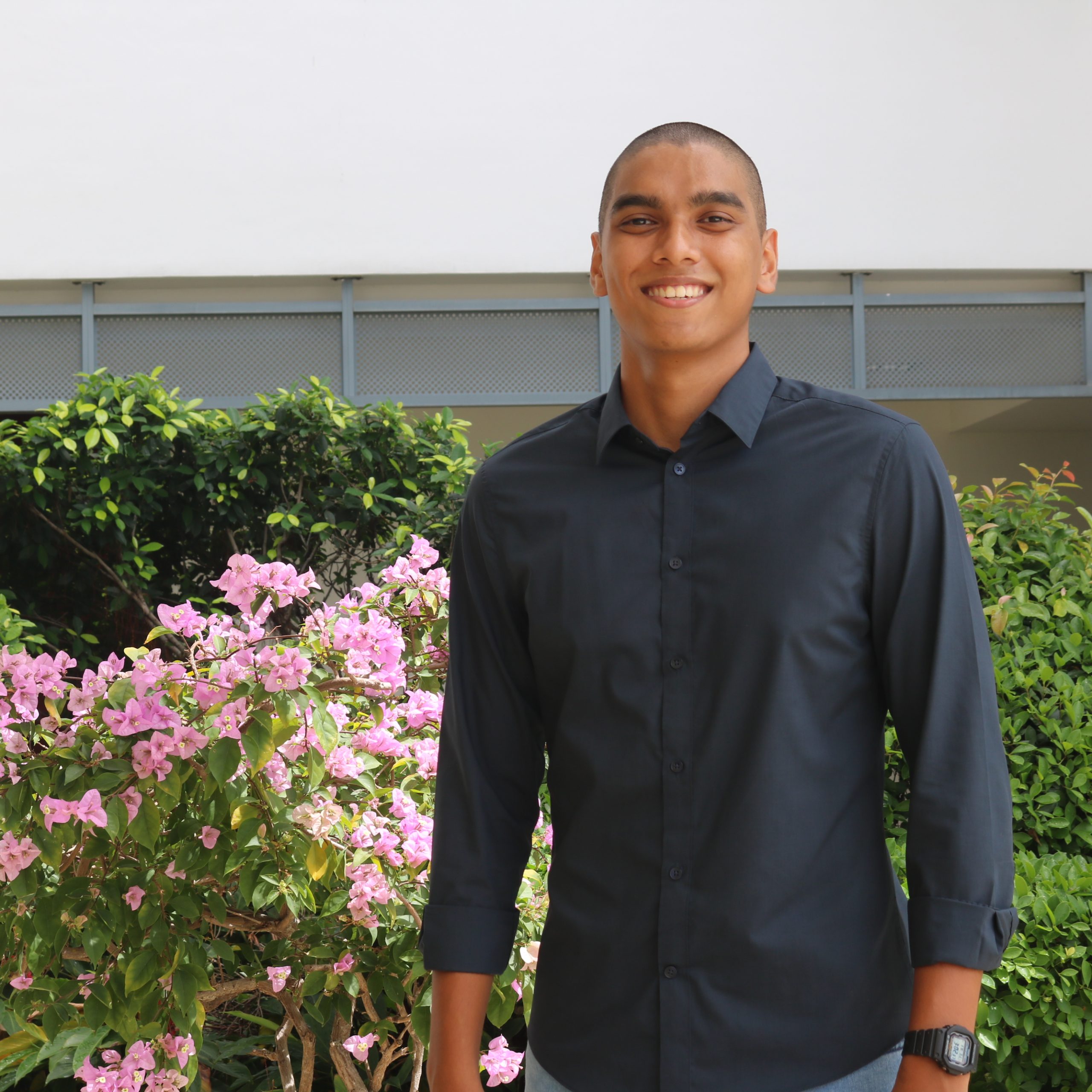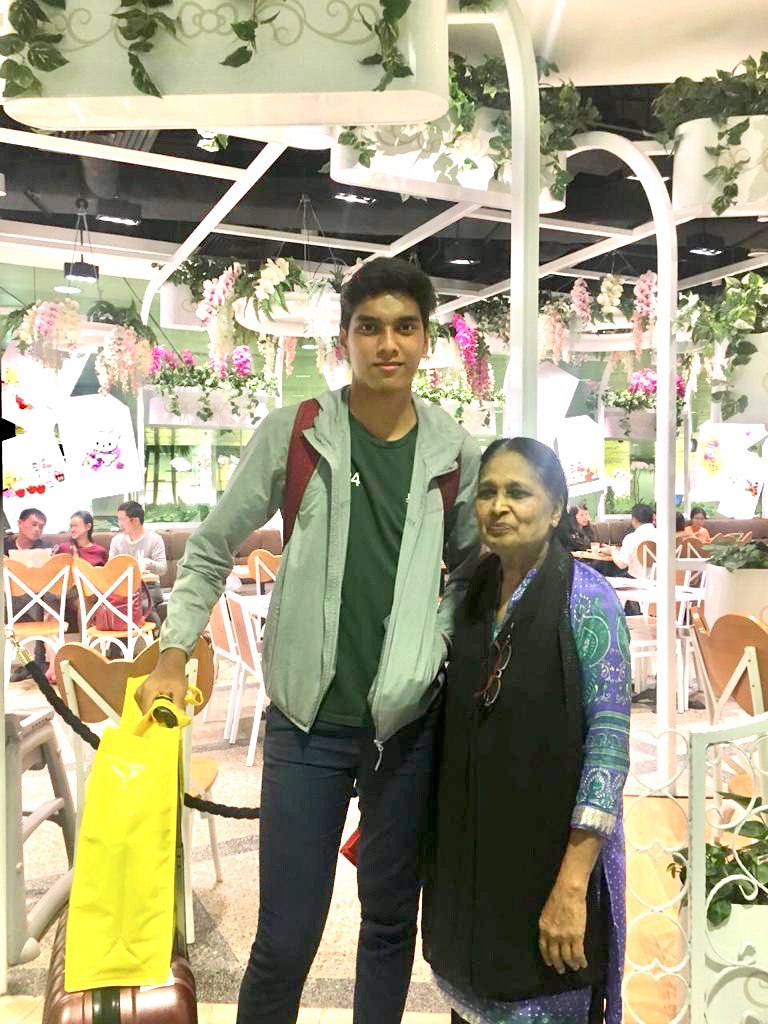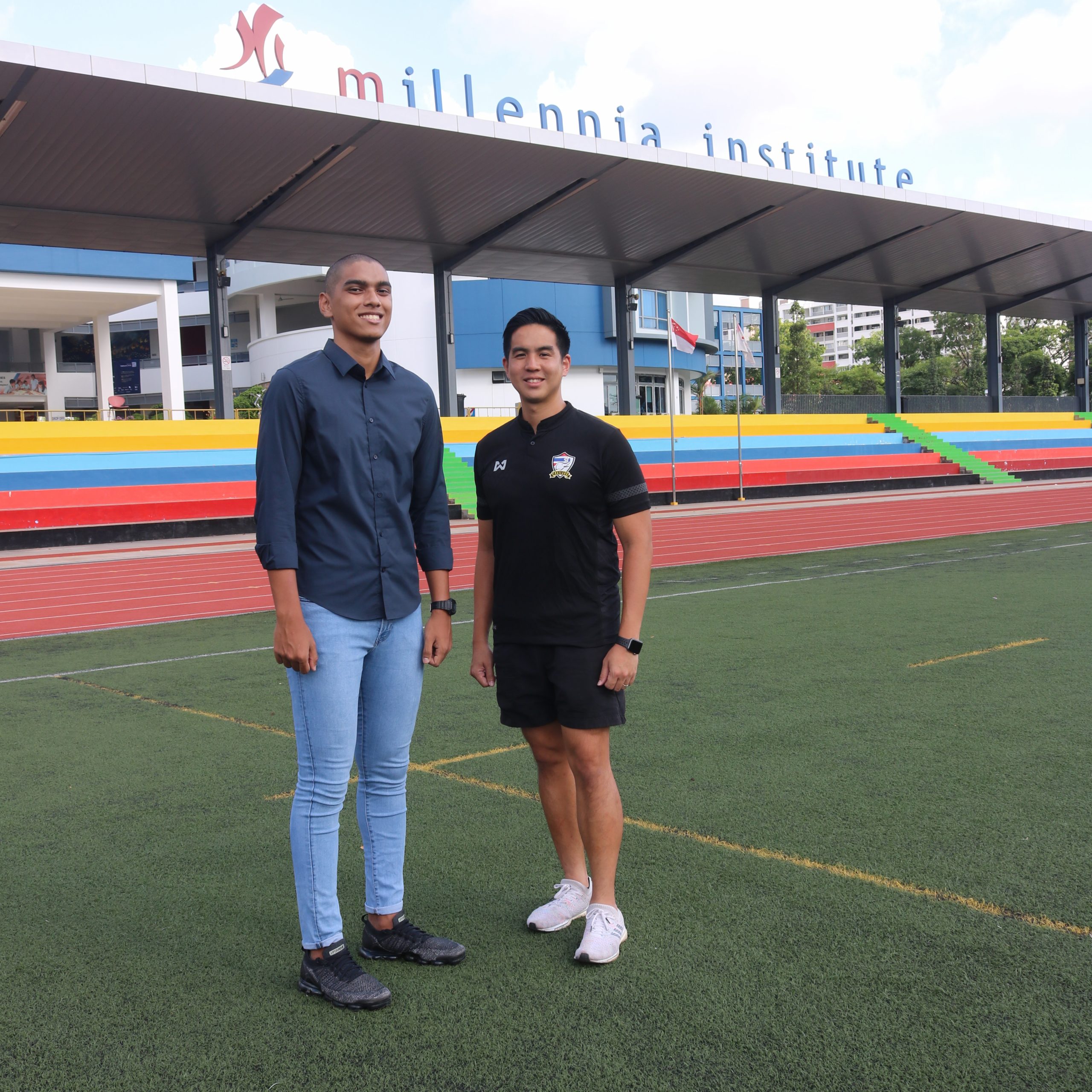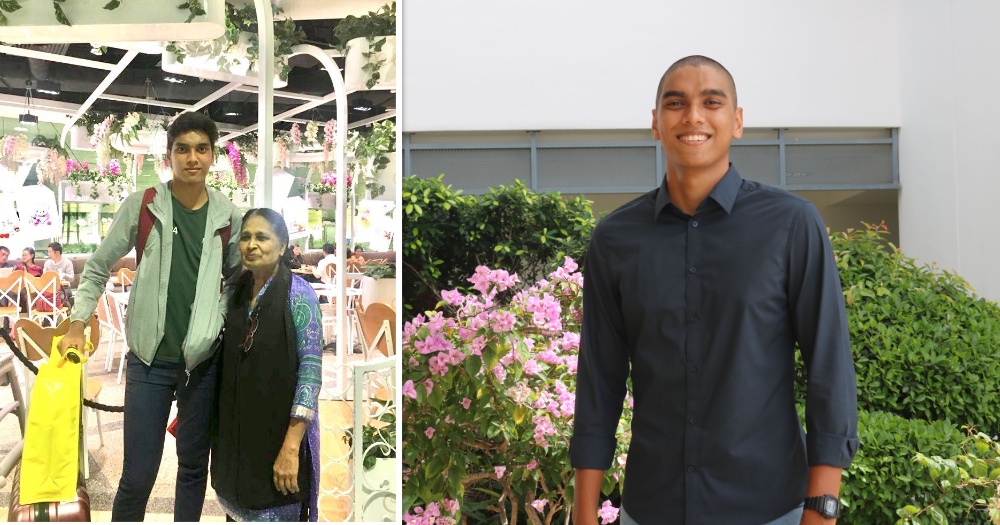Sanchay (who goes by one name) was in his early years of school at Millennia Institute when his mother was diagnosed with Amyotrophic Lateral Sclerosis (ALS), a disease that slowly breaks down a person's nerves, following which a sufferer's muscles eventually lose their ability to function.
You might remember ALS from the globally-viral "ice bucket challenge" back in 2014, where people challenged one another to upend buckets of ice over their heads to simulate the feeling of muscle stiffness associated with the degenerative condition, or donate money toward research into the disease, which currently still has no cure.
For Sanchay, though, this has, for the past three years, been far more than a simulation.
Despite having to juggle his studies, extra-curricular commitments and care for his critically ill mother, Sanchay managed to score one A and two Bs for his H2 subjects of Management of Business, Geography and Economics in the 2019 GCE A-Level examinations.
 Photo by Loo Ai Wei
Photo by Loo Ai Wei
Here is his story of resilience and tenacity amidst trying times, as well as how he eventually overcame the many curveballs life threw at him.
Did not do well in PSLE and O levels but MI was a turning point
Growing up, good grades were not always a given for 20-year-old Sanchay, who is currently serving his National Service.
With a sheepish look, Sanchay confesses that he did not do well in his studies during his Primary School Leaving Examinations (PSLE) and his GCE O-Levels.
"I ended up with 155 for my PSLE score and entered the Normal Academic (NA) stream in Assumption English School. From there, I worked my way up to the Express stream. Unfortunately, I got 29 points for my O-Level L1R5 score."
However, Sanchay counts himself lucky that he was accepted into MI with his L1R4 score of 18.
"As it was my last chance to work hard (before University), I worked my butt off and that’s how I got to where I am today," he says.
Elaborating on his time in MI, Sanchay tells me that school was "really manageable" with the support that he received from his teachers, as well as the after-school lessons that helped push him in his subject abilities.
MI, which provides a three year track for students to the A-Levels, also gave Sanchay "a lot of time to prepare for the major exam."
Two years to prepare for the A-Levels is simply not enough, according to him. "My JC friends always complain that the system is very rigorous."
The MI three-year system, on the other hand, is "perfect for students like me, who have a tough time coping with studies, especially with difficulties at home," he says.
Thrived as captain of football team
Apart from his studies, Sanchay was the captain of the football team during his time in MI -- a role which he thrived in.
His passion for football started at an early age and while he wasn't particularly skilled at it then, he continued honing his skills by playing with kids from his neighbourhood.
He eventually made it into the school team in secondary school, and reached his peak in MI.
"That was when my teachers gave me leadership opportunities to showcase my abilities and talent in the game," he smiles.
According to Shawn Ang, Sanchay's football teacher, Sanchay was "always down for training early" and would "always try to spur each and every member on," without ever looking down on the weakest players.
Ang also tells me that Sanchay had "a very vocal presence on the football team" and was able to both conduct himself very well and mentor others.
Close relationship with his mother
Sanchay's motivation for excelling in school was his 72-year-old mother, who single-handedly raised him and his two older siblings after her husband passed away from a heart attack seven years ago.
Elaborating on this, Sanchay tells me that his sole motivation up to the A-Levels was to please his mother and make her proud as the two of them share a very close bond.
"My mother worked really hard and always had my back. She always protected me from all the health, financial and household difficulties she had to face, which allowed me to focus on my studies."
 Sanchay with his mother. Photo courtesy of Sanchay
Sanchay with his mother. Photo courtesy of Sanchay
His mother's main priority, especially, was to make sure that Sanchay managed to get into university after both his older brother and older sister got married and settled down.
"My siblings, who are much older than me, also fostered a disciplined mentality in me to always do the right thing, even when nobody is looking. I would therefore say that my family has been the greatest pillar of support in my academic achievements."
With a slightly brooding glance, Sanchay adds that his mother has always been there for him and that he always thinks of her, even now when he is in NS.
Mother diagnosed with ALS
In 2018, Sanchay's family took a second huge hit when his mother was diagnosed with ALS and hospitalised at Singapore General Hospital.
The diagnosis only came to light after Sanchay's mother suffered many falls -- eight in total -- due to loss of muscle function.
Frustratingly, doctors didn't (or were unable to) pick up signs of Sanchay's mother's ALS when she fell for the first time.
So by the time she had her eighth fall, her condition was quite severe and it deteriorated ever since.
"Because there is no cure for her disease, her condition has only continued to worsen over time. Therefore it’s been a very painful journey, knowing that my mum only has so long more to live."
While his mother was hospitalised, Sanchay was supported financially by his siblings.
Aside from paying for their mother's hospital bills, Sanchay's siblings also gave him an allowance and made sure he "always went home with food on the table," which Sanchay is extremely grateful for.
Despite not having to worry about his mother's hospitalisation fees, Sanchay still felt that it was his duty as a son to visit her daily.
During his A-Level year, Sanchay made it a point to spend time with his mother at the hospital and have dinner with her every day after school.
Even on days when his football training ended at 8pm, he would make his way down to the hospital and stay with this mother until 11pm, before heading home to study till 3am to 4am.
Despite the hours, he maintains that it was not a burden to him because his mother would have done the same for him and his siblings.
Encouraged by his football coach
When Sanchay was just one month away from his A-Levels, he received terrible news: His mother was in critical condition. The hospital said that she had only six months left to live.
He was distraught:
"When I came to school, I couldn’t do anything, I couldn’t study, I couldn’t go and play football. The only thing I could think about was to make her proud."
Thankfully, Ang was sharp enough to notice that something was amiss.
"Sanchay didn't look like he was enjoying the training sessions. He would get a little bit emotional, which is different from his usual jovial self."
One night after football training, Sanchay finally poured his heart out, about his self-doubts as a football captain and his mother's health, to his teacher.
"So, I sat with him past training hours and told him about the different qualities he brings to the team, such as how his presence allows others to shine, which I think he was encouraged by," says Ang.
Sanchay agrees that his teacher was a pillar of support:
"Mr Ang told me not to give up, not to lose hope. He picked me up at my lowest point and if I knew today that my results would be as such, it would solely be because of Mr Ang and my mother."
 Sanchay with his football teacher, Shawn Ang. Photo courtesy of Loo Ai Wei.
Sanchay with his football teacher, Shawn Ang. Photo courtesy of Loo Ai Wei.
In the following weeks, Sanchay would update Ang about his mother's illness, as well as the other struggles he was facing.
In turn, Ang advised Sanchay to "try and focus more on the present", instead of thinking about what would happen to his mother in future.
Ang also told him that he didn't have to put himself out there for the team anymore as he had already contributed a lot, and that he should try to spend more time with his mother.
Although Sanchay credits Ang as an instrumental figure in helping him get back on his feet again, the latter says that Sanchay ultimately found the solutions to his problems himself.
Plans for the future
Now that Sanchay has received his A-Level results, he hopes to pursue a degree in political science at Nanyang Technological University and work in the public service after he graduates.
Citing his mother's strong work ethic at the Ministry of Manpower as his main inspiration, Sanchay says that he wants to join the public service because it is meaningful and helps build character, although much of it is "thankless work".
"My mother always had good things to say about the government, all the time. Society usually has a lot to criticise about the public service like how it is inefficient, or how it's very bureaucratic. But when you look at it from another perspective, public servants take criticisms in their stride and still make sure that our country is running successfully."
Sanchay also expressed his hopes that the education system would celebrate students who have progressed over time, instead of mere good results.
Explaining this, he says:
"We shouldn't just celebrate the good results that someone gets at the A Levels, or at PSLE. We should also showcase those individuals who have shown improvement over time. Like, wow, they went from a nobody to a somebody. That’s how I think education should be. Prioritising progress instead of just results."
In a miraculous turn of events, his mother has also made it past the six-month deadline her doctors had given her.
Despite the fact that she is still in critical condition, Sanchay hopes to focus on the positive side of things and to take each new day in his stride.
"When I was at my lowest, I couldn’t see the bright side of things. I had to get someone to help me and see the bright side of things. So, if you cannot see the bright side of things, get someone to help you see it, because it will really help you to keep pushing forward."
Stories Of Us is a series about ordinary people doing extraordinary things. Be it breaking away from conventions, pursuing an atypical passion, or making the world a better place in their own small way, these stories remind us both of our individual uniqueness and our collective humanity.
Top photos courtesy of Sanchay & by Loo Ai Wei. Quotes were edited for clarity.
If you like what you read, follow us on Facebook, Instagram, Twitter and Telegram to get the latest updates.
